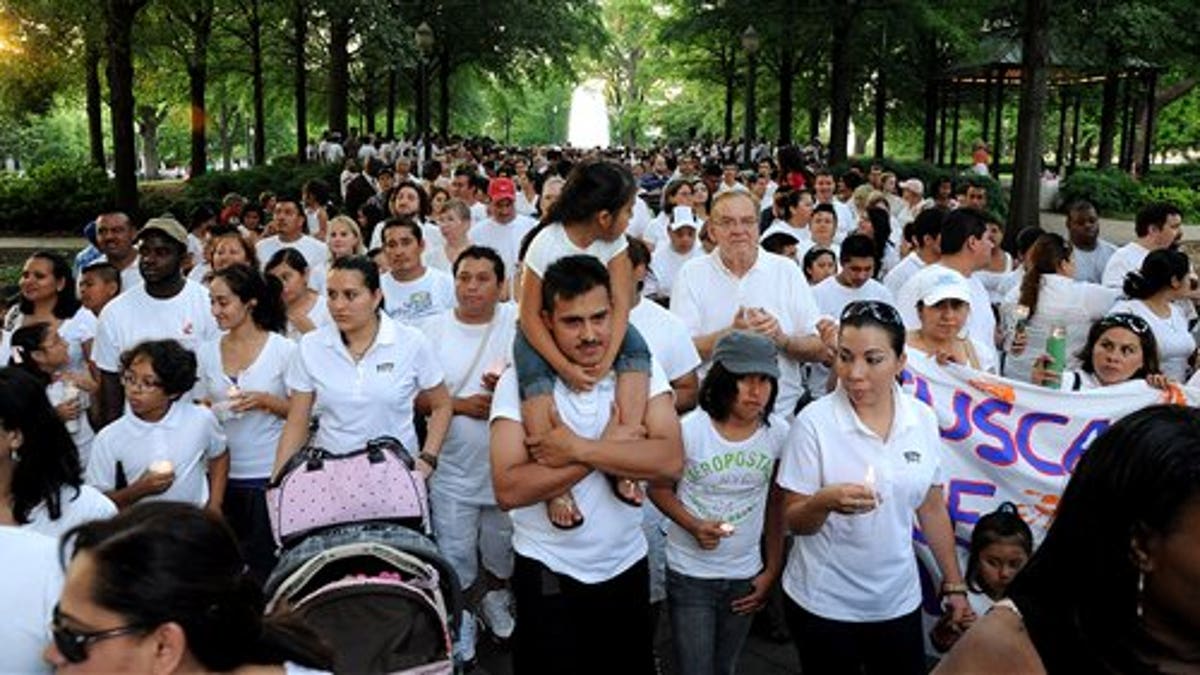
Participants in a protest against Alabama's new law against illegal immigration march through Linn Park, Saturday, June 25, 2011, in Birmingham, Ala. The new law takes effect Sept. 1, 2011, and makes it a crime to knowingly hire illegal immigrants, rent them places to live or give them rides. It also requires schools to determine the immigration status of their students and report it to the state, although children in the country illegally would not be refused enrollment. MAGS OUT (AP Photo/ The Birmingham News, Mark Almond) (AP)
Lawyers for the federal government and for a coalition of civil rights groups, including Alabama church leaders, presented their case to block a new Alabama immigration law that they argue stomps on rights like the freedom of speech and freedom to travel.
Deputy Assistant U.S. Attorney General William Orrick told U.S. District Judge Sharon Blackburn in Birmingham that sections of Alabama's law — which has been described by opponents and supporters as the toughest such law in the country — should be blocked because they conflict with federal law.
But an Alabama legislator said in an interview that the law was intended to protect the rights of citizens.
Blackburn was holding a hearing on lawsuits filed by the U.S. government, civil rights groups including the American Civil Liberties Union and Alabama church leaders that seek to block the new law signed by Gov. Robert Bentley in June.
Orrick said the new law intrudes on the authority of the federal government. Judges have blocked all or parts of similar laws in Arizona, Utah, Georgia and Indiana.
"There's no room for the states to be legislating in this area," Orrick told Blackburn, who listened to three hours of arguments from opponents of the law Wednesday morning. She was to hear arguments later Wednesday from Alabama Attorney General Luther Strange and other attorneys for the state asking her to let the law take effect Sept. 1.
Orrick told Blackburn that the law makes criminals out of people who rent houses to undocumented immigrants and in some cases makes it a crime to work.
Orrick argued the law harms the reputation of the U.S. with other countries.
"It corrodes the reputation of the United States for American values like openness and welcoming others," Orrick said. He also criticized a section of the law that requires schools to report the immigration status of students, saying it would make parents afraid to send their children to school.
After hearing the arguments from Orrick and other plaintiffs' attorneys, Republican state Sen. Scott Beason of Gardendale, one of the lawmakers who sponsored the law, said he did not hear any discussion of the rights of legal Alabama residents.
"I didn't hear the federal government of the ACLU arguing about the rights of citizens of Alabama who have been displaced from their jobs by these illegal immigrants. Who's looking out their rights?" Beason said in an interview.
He defended the provision requiring schools to report immigration status of students, saying the information parents will be asked to provide "is not different from what other parents have to provide. I have to show where my kids were born."
During the hearing, ACLU attorney Cecillia Wang questioned a provision of the law allowing police to detain people after a routine traffic stop if they suspect them of being in the country illegally. She said the provision would turn "law enforcement officers into immigration agents" and would subject innocent citizens to detention while their immigration status is being determined.
Blackburn frequently interrupted attorneys and indicated she would address the issues in depth in her written ruling, but she gave no indication when she would rule.
Blackburn told Southern Poverty Law Center attorney Sam Brooke that she was leaning toward accepting arguments that some parts of the Alabama law pre-empt the authority of the federal government.
"I very much want to look at the pre-emptive issues," Blackburn said.
At one point, Blackburn urged attorneys on both sides to avoid the passionate political arguments that might be made if the issue was being debated in the Legislature.
"The issue for me is not whether I would have voted for this statute. The issue for me is whether it's constitutional," Blackburn said.
Based on reporting by the Associated Press.
Follow us on twitter.com/foxnewslatino
Like us at facebook.com/foxnewslatino




